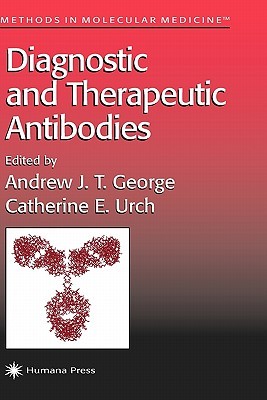
- We will send in 10–14 business days.
- Publisher: Humana
- ISBN-10: 0896037983
- ISBN-13: 9780896037984
- Format: 16 x 23.7 x 3.4 cm, hardcover
- Language: English
- SAVE -10% with code: EXTRA
Diagnostic and Therapeutic Antibodies (e-book) (used book) | bookbook.eu
Reviews
Description
Soon after the first description of monoclonal antibodies in 1976, there was enormous interest in the clinical application of antibodies, especially in the context of cancer. Antibodies appeared to offer the "magic bullet" that would allow the specific destruction of neoplastic cells. H- ever, many years' effort resulted in very few cases of successful immu- therapy with antibodies. As a result there was a major backlash against antibody therapy, and the field lost a considerable amount of popularity. Fashion, in science as well as in other things, tends to be cyclical. Antibody-based therapy is once again attracting scientists and clinicians. There are several reasons for the renewed optimism; certainly the expe- ence of the last two decades has provided a wealth of information about problems associated with antibody therapy, and possible solutions to these problems. Recombinant antibody engineering has rejuvenated the field, allowing both the modification of antibodies to improve their in vivo pr- erties and the isolation of novel antibody molecules by such techniques as phage display. The results of recent clinical trials have demonstrated unequivocally the benefit of antibody therapy in a number of settings, and, finally, more careful consideration has been taken of the types of disease best treated using this approach.
EXTRA 10 % discount with code: EXTRA
The promotion ends in 19d.00:35:56
The discount code is valid when purchasing from 10 €. Discounts do not stack.
- Publisher: Humana
- ISBN-10: 0896037983
- ISBN-13: 9780896037984
- Format: 16 x 23.7 x 3.4 cm, hardcover
- Language: English English
Soon after the first description of monoclonal antibodies in 1976, there was enormous interest in the clinical application of antibodies, especially in the context of cancer. Antibodies appeared to offer the "magic bullet" that would allow the specific destruction of neoplastic cells. H- ever, many years' effort resulted in very few cases of successful immu- therapy with antibodies. As a result there was a major backlash against antibody therapy, and the field lost a considerable amount of popularity. Fashion, in science as well as in other things, tends to be cyclical. Antibody-based therapy is once again attracting scientists and clinicians. There are several reasons for the renewed optimism; certainly the expe- ence of the last two decades has provided a wealth of information about problems associated with antibody therapy, and possible solutions to these problems. Recombinant antibody engineering has rejuvenated the field, allowing both the modification of antibodies to improve their in vivo pr- erties and the isolation of novel antibody molecules by such techniques as phage display. The results of recent clinical trials have demonstrated unequivocally the benefit of antibody therapy in a number of settings, and, finally, more careful consideration has been taken of the types of disease best treated using this approach.


Reviews